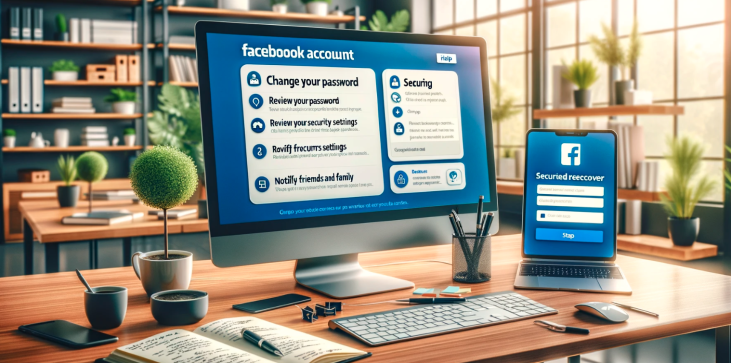
In the era of digital communication, Facebook has become a cornerstone of social interaction, business promotion, and personal branding. Yet, with the ubiquity of Facebook comes the increased risk of account hacking. As someone who's navigated the digital realm for years, I've seen my fair share of security breaches and the havoc they wreak. A hacked Facebook account is more than just an inconvenience; it's a violation of personal space and privacy. It can lead to identity theft, loss of sensitive information, and can even damage your reputation if left unchecked. Understanding the potential risks and vulnerabilities can empower you to act swiftly in the unfortunate event that your account is compromised. Hacking can happen to anyone, regardless of how tech-savvy they are. It's not a reflection of your intelligence or ability to safeguard your information; it's a testament to the sophistication of hackers and their ever-evolving tactics. In this comprehensive guide, I will walk you through each step to take back control of your Facebook presence. The importance of recognizing the signs of a hacked account cannot be overstated. It's the crucial first step in mitigating damage and reclaiming your digital identity. I want to prepare you, through my experiences and expertise, to not only address a facebook account hacked situation but to prevent it from happening in the first place. Let's delve into the world of Facebook security and ensure your account remains in the right hands—yours.
Recognizing the signs of a compromised account early on can be the difference between a quick recovery and a prolonged nightmare. In my time online, I've learned to watch for red flags that indicate unauthorized access. The most obvious sign is an inability to log into your account with your known password. If your facebook account hacked and password changed without your consent, it's a clear giveaway that someone else has taken control.
Another telltale sign is the discovery of posts, messages, or friend requests that you don't remember initiating. Hackers often use compromised accounts to spread spam or malicious links. If your friends report receiving odd messages from you, or if you notice unfamiliar activity on your timeline, take it seriously. Lastly, receiving emails or notifications from Facebook about unrecognized logins or password changes are definitive indicators that your account's security has been breached.
It's critical to regularly check your account's active sessions in the security settings. If you see unfamiliar devices or locations, it's time to act. Hackers might be subtle, but they often leave digital footprints. Being vigilant about your Facebook activity and monitoring for these signs can prevent a full-blown facebook hacked account crisis.
When I first faced a hacked facebook account, my initial reaction was panic. However, I quickly learned that decisive action was necessary to minimize damage. The first step is to try and regain control of your account immediately. If possible, log in to your Facebook account and change your password to something complex and unique. This may lock out the intruder if they haven't already changed your password.
If you're unable to log in because your password has been altered, use Facebook's 'Forgot Password' feature to reset it. You'll need to follow the prompts, which may include identifying friends in photos or providing your email or phone number linked to the account. In cases where the hacker has altered the contact information, you can report to Facebook that your account has been compromised, which will initiate a recovery process.
During this time, alert your friends and family that your account has been hacked to prevent them from falling victim to scams perpetuated in your name. It's also wise to check your connected email accounts for security breaches and change those passwords as well. Taking these immediate steps can seem daunting, but they are crucial for reclaiming your account.
Recovering a hacked Facebook account is a multi-step process that requires patience and diligence. If your my facebook account hacked how to recover concern is pressing, Facebook's Help Center is your starting point. They have a specific section for compromised accounts, which will guide you through various recovery options. You'll be asked to identify yourself and provide any information that can help confirm your ownership of the account.
Once you've submitted your recovery request, Facebook will review it and provide further instructions. This process may involve submitting a government ID or answering additional security questions. It's paramount to provide accurate and up-to-date information to expedite the recovery process.
After regaining access, conduct a thorough review of your account settings. Check your personal information, change security questions, review app permissions, and remove any unrecognized devices or locations. This ensures that the hacker has no lingering access to your account. Remember, recovering a facebook hacked account isn't just about regaining entry—it's about securing your account for the future.
Prevention is always better than cure. To protect your Facebook account from future attacks, start by creating a strong, complex password that's hard to guess. Use a combination of upper and lower case letters, numbers, and symbols. Avoid using easily accessible personal information like birthdays or anniversaries.
Enable two-factor authentication (2FA) for an extra layer of security. This requires a second form of identification, such as a code sent to your mobile phone, before you can log in. It's a powerful deterrent against unauthorized access. Additionally, be cautious with the third-party apps you connect to your Facebook account. They can be potential gateways for hackers. Regularly review app permissions and remove those you no longer use or trust.
Educating yourself about phishing scams and how to recognize them is also essential. These scams often come in the form of emails or messages that mimic legitimate companies, luring you to click on harmful links or provide personal information. Always verify the authenticity of messages before responding or clicking on links.
If you've fallen victim to a facebook account hacked scenario, it's important to report it to Facebook as soon as possible. This not only helps you begin the recovery process but also alerts Facebook to the issue, which can help them enhance their security measures and protect other users.
To report, navigate to the Facebook Help Center and find the section for compromised accounts. Follow the prompts to specify the nature of the issue and provide any relevant details. Facebook's support team will then investigate the matter and work with you to secure your account.
Keep in mind that responding to these situations is a priority for Facebook, but it may still take some time to resolve. Therefore, patience and cooperation are key. Make sure to provide clear, detailed information to ensure a smoother recovery process.

Understanding common hacking methods can give you an edge in safeguarding your account. One prevalent tactic is phishing, where hackers create fake login pages to capture your credentials. Always double-check URLs and look for the secure "https://" before entering any login information.
Keylogging is another technique where hackers record the keystrokes on an infected computer. To avoid this, regularly update your antivirus software and don't log into Facebook on public or shared computers. Social engineering exploits the human element, tricking people into giving away their information. Be skeptical of any unusual messages, even if they appear to be from friends or family.
Password cracking software can guess passwords based on dictionary words and commonly used sequences. This is why complex, unique passwords are crucial. Lastly, Wi-Fi eavesdropping can occur on unsecured networks, allowing hackers to intercept data. Avoid using public Wi-Fi for sensitive transactions, or use a VPN to encrypt your connection.
Facebook offers several additional security features that I've found to be invaluable. Login alerts notify you whenever your account is accessed from an unrecognized device or location. This can be an early warning sign of a breach.
Reviewing your account's active sessions regularly can help you spot any unauthorized access quickly. If you see anything suspicious, you can end the session and change your password immediately. Facebook also allows you to nominate trusted contacts who can help you regain access to your account if you're locked out.
Another feature I recommend is the security checkup tool provided by Facebook. It guides you through steps to strengthen your account's security, including updating your password and enabling 2FA. Taking advantage of these features can greatly reduce the risk of a facebook account hacked situation.
Sometimes, despite your best efforts, the recovery process can be overwhelming or complicated. In such cases, seeking professional help can be the best course of action. Cybersecurity experts or companies specializing in digital security can provide assistance and guidance in recovering your account.
These professionals can navigate the technicalities and work with Facebook's support team on your behalf. They can also offer personalized advice to fortify your account against future attacks. While this may come at a cost, the peace of mind and security of your digital identity are often worth the investment.
Nobody expects their Facebook account to be hacked, but should it happen, being prepared and informed is your best defense. From understanding the signs and immediate steps to take, through to recovery and prevention, I've aimed to arm you with the knowledge to address a facebook account hacked dilemma effectively.
Always stay vigilant, regularly update your security settings, and don't underestimate the importance of a strong password and additional security measures. Should you find yourself in a compromised position, remember that you have the tools and support to recover and secure your account.
If you've found this guide helpful, or if you're currently struggling with a hacked Facebook account and need more personalized advice, don't hesitate to reach out. Remember, your digital safety is paramount, and reclaiming your online presence is always possible with the right steps.
Some signs that your Facebook account may have been hacked include unexpected friend requests or messages sent from your account, changes to your profile information, and login alerts for unrecognized devices. If you notice any of these signs, it's important to take action immediately to secure your account.
If you think your Facebook account has been compromised, the first step is to change your password as soon as possible. You can also enable two-factor authentication for added security. Additionally, check your recent activity log to see if there are any unfamiliar posts or actions taken on your behalf. If you find anything suspicious, report it to Facebook through their Help Center.
Yes, in many cases, you can recover a hacked Facebook account by following the steps outlined above and contacting Facebook support. They will guide you through the process of regaining access to your account and securing it against future attacks. However, keep in mind that recovery may not be immediate, so it's important to act quickly and follow all instructions carefully to ensure the best chance of success.